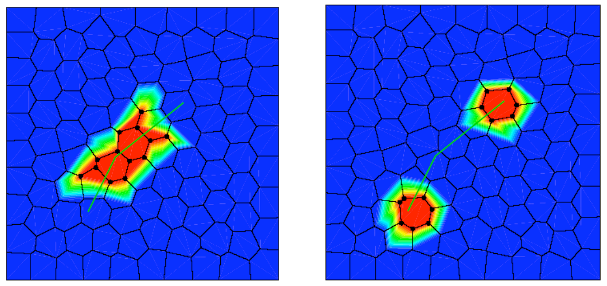Plenary Lecture, 14th Pan-American Congress of Applied Mechanics
N. Sukumar
Department of Civil and Environmental Engineering
University of California, Davis
http://dilbert.engr.ucdavis.edu/~suku
Generalized barycentric coordinates (e.g., Wachspress, mean value coordinates, maximum-entropy coordinates, and harmonic coordinates) have been widely adopted for applications in geometry processing and as basis functions in polygonal and polyhedral finite element methods. In recent years, the advantages of barycentric finite element methods have come to the forefront in applications such as mesh insensitive failure modeling, topology optimization, and Stokes flow. In this talk, I will first present an overview of the construction and key features of barycentric finite element methods. Then, the virtual element method (VEM), which is a Galerkin approach that does not require the computation of basis functions, will be described. Numerical examples will be presented that demonstrate the accuracy and establish the optimal rate of convergence of linear and higher-order barycentric finite element methods on second-order elliptic problems. The connection of the VEM to well-known hourglass stabilization techniques for low-order finite element methods on quadrilaterals and hexahedrals will be presented. Finally, I will discuss the outlook of these emerging discretization techniques in computational mechanics.
BIO: Sukumar holds a B.Tech. from IIT Bombay in 1989, a M.S. from Oregon Graduate Institute in 1992, and a Ph.D. in Theoretical and Applied Mechanics from Northwestern University in 1998. He has held post-doctoral appointments at Northwestern and Princeton University, before joining UC Davis in 2000, where he is currently a Professor in Civil and Environmental Engineering. Sukumar has spent sabbatical visits at Cornell University and SLAC National Accelerator Laboratory. Sukumar’s current research focuses on polygonal and polyhedral finite elements, maximum-entropy approximants, modeling of crack discontinuities with extended finite elements, and development of a partition-of-unity finite element method for large-scale ab initio quantum-mechanical calculations.
Organized by: 14th Pan-American Congress of Applied Mechanics
When: Monday, March 24th, 2014 at 9:30 AM
Where: Hotel Nippon. Barón Pierre de Coubertin 62, Santiago, Chile

